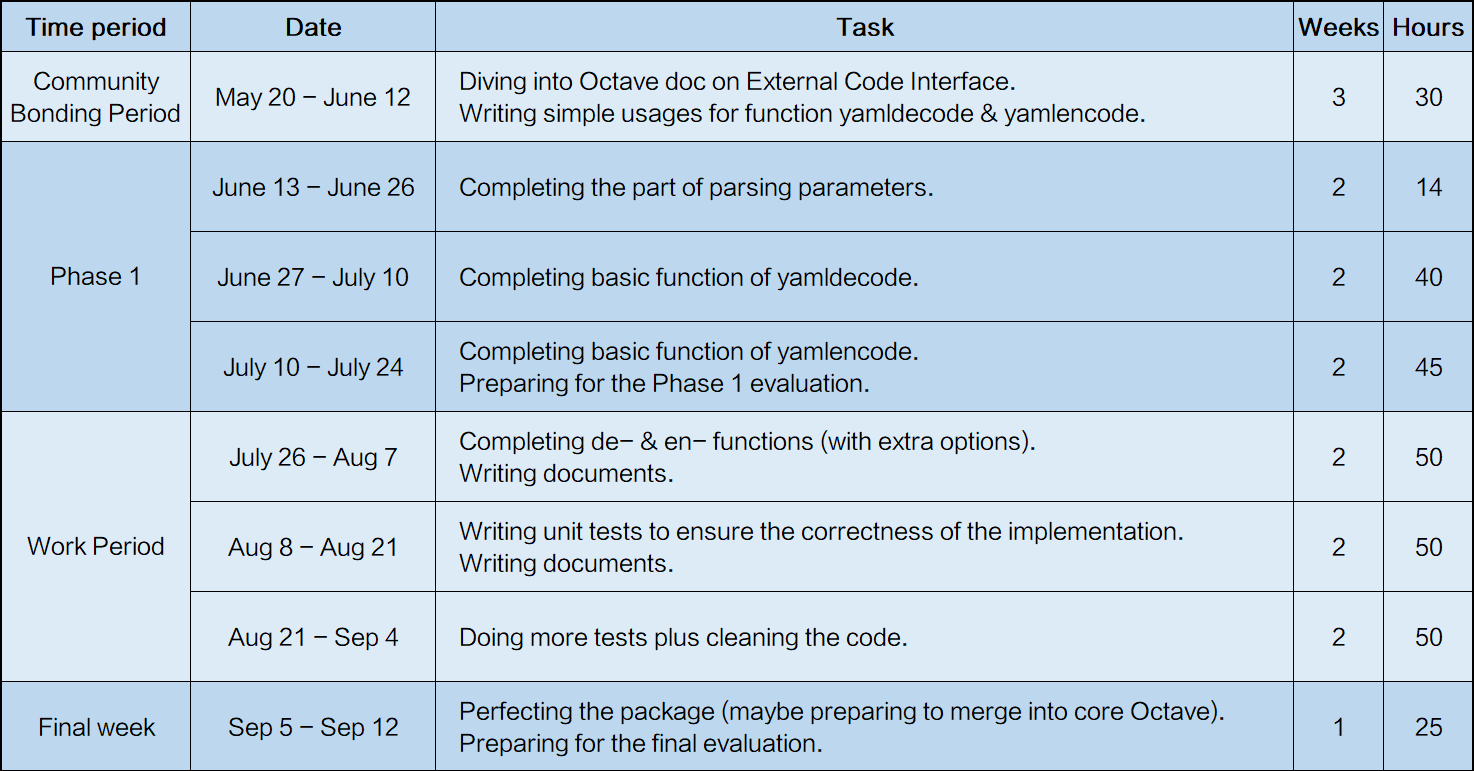今年终于鼓起勇气参加了 GSoC (Google Summer of Code),加入的组织是去年我就看上的 GNU Octave。
今年的 GSoC 我还是做了一些准备工作,写下了一些官方相关文档的解释,感兴趣的可以查看:
Time management for contributors 开发时间安排
以下是我的 GSoC 2022 Proposal 申请书。
(2022/5/21 注:这篇申请书最终没有通过,我的 GSoC 2022 计划最终只能搁浅。具体原因可能有很多吧,不过我还是挺希望自己之后能最终独立完成这个项目。)
YAML Support for GNU-Octave
Name: Han Wang
Email: jmfymxx@gmail.com
Github: https://github.com/1099255210
Accout on Octave Discourse: wh-1099255210
Project Description
YAML, as well as JSON, is a very common data format. GNU Octave has built-in support of JSON, but still lacks of YAML support. The goal of the project is to implementing YAML support into Octave with Rapid YAML (a fast C++ library). During the project, an Octave package containing yamldecode() & yamlencode() functions with proper documentation and unit tests will be created, and the package will be considered to be merged into core Octave.
Related Work
In GSoC 2020, JSON format has been successfully implemented. The package pkg-json is a good example on how to encode and decode this kind of data format. The pkg-json used rapidjson (a JSON parser and generator for C++), while in my project I decide to use Rapid YAML, which is a C++ library to parse and emit YAML.
My Project Plan
First, I have to get familiar with YAML data format in case to know the proper conversion between YAML data types and Octave data types. I have made a table on this:
From YAML to Octave data (will be used in yamldecode())
| YAML Data Type | Octave Data Type |
|---|---|
| Number | scalar double |
| Boolean | scalar logical |
| String | character vector |
| Dictionary | scalar struct |
| List, of Numbers | double array |
| List, of Booleans | logical array |
| List, of Strings | string array |
| List, of Dictionary - Same field names | struct array |
| List, of Dictionary - Different field names | cell array of scalar struct |
| null, in numeric lists | NaN |
| null, in nonnumeric lists | Empty double array |
From Octave data to YAML (will be used in yamlencode())
| Octave Data Type | YAML Data Type |
|---|---|
| scalar logical | Boolean |
| logical vector | List, of Booleans, reshaped to row vector |
| logical array | List, of Booleans, nested |
| scalar numeric | Number |
| numeric vector | List, of Numbers, reshaped to row vector |
| numeric array | List, of Numbers, nested |
| NaN, NA, Inf, -Inf | null (1) \ “NaN”, “NaN”, “Infinity”, “-Infinity” (2) |
| character vector | String |
| character array | List, of Strings |
| scalar cell | List |
| cell vector | List, reshaped to row vector |
| cell array | List, flattened to row vector |
| scalar struct | Dictionary |
| struct vector | List, of Dictionaries, reshaped to row vector |
| struct array | List, of Dictionaries, nested |
(1) ConvertInfAndNan = true
(2) ConvertInfAndNan = false
With tables above, it will be much easier to convert data from one side to the other side. I just need to recursively decompose data, convert them respectively to what they should be, then put them together as an output.
My Timeline

About Me
I’m currently a junior CS student. I’m good at C/C++ programming, and work with JSON/YAML very often, so I’m familiar with them. I’m used to putting my codes on github and using git to manage them, but I’ve never really been a contributor in open source projects. So this is my first time to be a part of the open source community, and I’m really excited about it.
During the past few weeks, I have joined the GNU Octave Developer Community, and have been a member in Octave discourse. Under the guidance of the mentor, I have created the pkg-yaml repository on github, committed my code to it. The package can now be installed, and has the function to parse simple YAML data to Octave data. I also sent a pull request to Rapid YAML to help fix their amalgamate script to generate header files, and it successfully got merged into master branch.
I believe with my enthusiasm and patience, I will be up to this job.